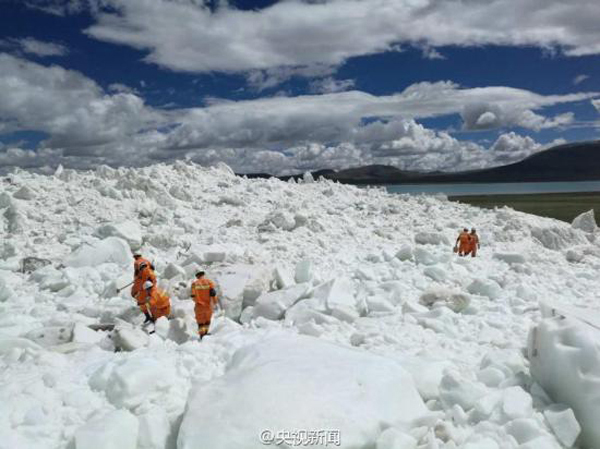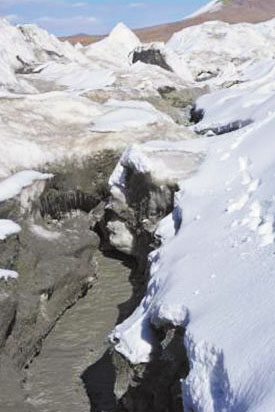


Rescuers search for missing herders after an icefall in Ngari Prefecture in July 2016. (Photo/CCTVNEWS)
A Sino-US scientific expedition team led by Chinese academician Yao Tandong arrived in Lhasa, Tibet, on July 13. The team aims to explore the reason behind two ice avalanches in Ngari Prefecture last year, Science and Technology Daily reported.
Yao is the director of the Qinghai-Tibet Plateau Institute under the Chinese Academy of Sciences (CAS). Lonnie Thompson, a famous glacier scholar from the United States, has participated in the expedition. Both Yao and Thompson are Vega Medal winners. The Swedish Society for Anthropology and Geography awards the Vega Medal every three years to people who have shown excellence in the fields of physical geography, exploration, or archaeology.
The first icefall in the plateau took place in July 2016. Millions of tons of ice broke off from the Aru Glacier in the mountains of western Tibet at an altitude of about 5,800 meters and tumbled into a valley below, taking the lives of nine nomadic yak herders living there. Two months later, another icefall occurred. Fortunately, no people died this time, thanks to the researchers' early warnings.

A river is formed after the second icefall in Ngari Prefecture in September 2016. (Photo/Science and Technology Daily)
Experts from China's State Key Laboratory of Cryospheric Sciences once said that glacial collapses in Ngari Prefecture are not isolated incidents. Just like the icefalls caused by glacier surges at the Namjagbrawa Peak in the region of Nyingchi, they are the result of glacial movements.
However, Yao holds a different view. Based on decades of research, he thinks the glaciers in Ngari Prefecture are stable, featuring low temperature, low accumulation, and slow changes and movements. "There is no written record of such icefalls in the Qinghai-Tibet Plateau," said Yao.
The cause of the icefalls in Ngari is still controversial. One commonly accepted view is that climate change and rainfall increase are the leading forces. Most scientists predict that similar icefalls will occur again. Therefore, this joint expedition aims to confirm whether there will be another icefall soon, and if so, figure out when and where.
 Fire brigade in Shanghai holds group wedding
Fire brigade in Shanghai holds group wedding Tourists enjoy ice sculptures in Datan Town, north China
Tourists enjoy ice sculptures in Datan Town, north China Sunset scenery of Dayan Pagoda in Xi'an
Sunset scenery of Dayan Pagoda in Xi'an Tourists have fun at scenic spot in Nanlong Town, NW China
Tourists have fun at scenic spot in Nanlong Town, NW China Harbin attracts tourists by making best use of ice in winter
Harbin attracts tourists by making best use of ice in winter In pics: FIS Alpine Ski Women's World Cup Slalom
In pics: FIS Alpine Ski Women's World Cup Slalom Black-necked cranes rest at reservoir in Lhunzhub County, Lhasa
Black-necked cranes rest at reservoir in Lhunzhub County, Lhasa China's FAST telescope will be available to foreign scientists in April
China's FAST telescope will be available to foreign scientists in April "She power" plays indispensable role in poverty alleviation
"She power" plays indispensable role in poverty alleviation Top 10 world news events of People's Daily in 2020
Top 10 world news events of People's Daily in 2020 Top 10 China news events of People's Daily in 2020
Top 10 China news events of People's Daily in 2020 Top 10 media buzzwords of 2020
Top 10 media buzzwords of 2020 Year-ender:10 major tourism stories of 2020
Year-ender:10 major tourism stories of 2020 No interference in Venezuelan issues
No interference in Venezuelan issues
 Biz prepares for trade spat
Biz prepares for trade spat
 Broadcasting Continent
Broadcasting Continent Australia wins Chinese CEOs as US loses
Australia wins Chinese CEOs as US loses